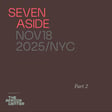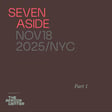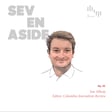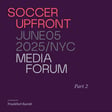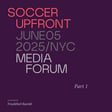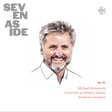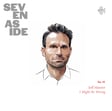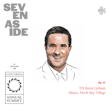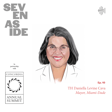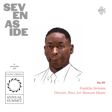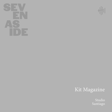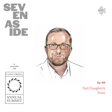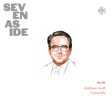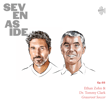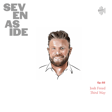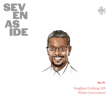Become a Creator today!Start creating today - Share your story with the world!
Start for free
00:00:00
00:00:01

Andrew Tuck
The Monocle Editor in Chief and host of Monocle Radio’s The Urbanist sheds light on a “decoupling” within the post-pandemic urban recovery matrix; recounts a conference in Prague that underscores the growing influence of cities in international diplomacy; puts context to soft power and state investment in sport; and speaks to Monocle's principles as a modern media enterprise
Transcript
Publishing Industry's Existential Crisis
00:00:05
Speaker
The publishing industry is soon to face an existential reckoning brought on by an economic collapse in the entrenchment of social media.
Monocle's Global Intelligence Focus
00:00:11
Speaker
Monocle's founding, in 2007, wagered on an appetite, lasting one at that, for global intelligence thoughtfully packaged and presented with wit, elan, and a commitment to journalistic craft and inventive storytelling at its core.
Urban-Themed Initiatives by Monocle
00:00:23
Speaker
woven into the proposition to this day is an abiding affection for and fascination with cities in the evolving urban blueprint. It shows up in Monaco radio program The Urbanist, in newspaper specials and hardcover books, in Monaco produced advertising supplements, in the locales of its bureau and cafes, and indeed issued issue in the 10 editions of the flagship print magazine Monaco puts out each year.
00:00:43
Speaker
And as you learn here, it entails an enviable stamina for globetrotting and countless face-to-faces with city and design leaders the world
Quality of Life Survey with Andrew Tuck
00:00:49
Speaker
over. The Quality of Life survey, one of several big annuals, is Monocle's yearly report card for the state of cities and a ranking of urban capitals per an expanding set of criteria.
Urban Recovery and Diplomacy
00:00:58
Speaker
Mere days from the 2023 Quality of Life conference in Munich, we enjoy a wide-ranging conversation with Monocle's co-founding editor-in-chief and host of The Urbanist, Andrew Tuck. Among the insights, Tuck sheds light on a stark decoupling within the post-pandemic urban recovery matrix,
00:01:12
Speaker
recounts a conference in Prague that underscores the growing influence of cities and international diplomacy, puts context to soft power and sports washing, and speaks to the DAO and principles of Monaco as a modern media company and brand.
00:01:28
Speaker
But, Andrew Tuck, thank you so much for joining us. And to get us started, the business, if you will, of cities and urbanism has become a veritable industry in recent years. Organizations and content producers of all stripes cascading in and jostling for share of voice. For its part, Monocle has been in the center of the conversation since the publication debuted in 2007 and perhaps no more explicitly than through its Quality of Life annual.
Reflecting Urban Life in Storytelling
00:01:52
Speaker
Tell us, how have you managed to keep quality of life not only fresh, but more over important all these years for your readership, for your business partners, for your decision makers, so forth? I think we recognized very early on that we had a readership that, especially at the beginning, lend very much into being city dwellers, urban passionate people. And we wanted to reflect that on page, but we looked around and we saw that much of the coverage at that time, I think, of cities was
00:02:20
Speaker
If somebody did a survey of cities, if someone did a ranking of cities, if someone tried to pull together reports, it was always done with this kind of view that maybe you were going to move there with your corporation. Maybe you were going to be there for a couple of years and move on. The key things would be with a good school for your kids to go to, you know, how much it was going to cost you to rent an apartment. Now, while those things are important, we wanted to do a survey that was looking actually at both the tougher things as well as the softer things that make city work.
00:02:50
Speaker
But we also just wanted to tell those stories across the pages, you know, that we felt that the world of urbanism had been hived off as a kind of academic pursuit. And you often read rather jargon heavy stories about what needed to happen to the public realm or to the spaces that we inhabit.
Future of Cities and Remote Work
00:03:07
Speaker
And we felt, again, that there was a role for us to be the person, the brand, the company in the middle who was maybe going to those conferences, maybe knocking on the doors of mayors around the world, hearing the things that they were trying to do, and then translating them into stories with a very clear, simple language that made it clear that what happens in our cities is everybody's concern.
00:03:31
Speaker
And it's something that we should all be pitching in and making sure that our voices are heard. You mentioned the tougher things. And just last week, New York City, which of course is my hometown, announced plans to rezone parts of Midtown Manhattan to convert office stock to residential, which is a milestone to say the least.
00:03:47
Speaker
When you look at measures like this, when you think about the systemic precarities of cities like New York, Los Angeles, and London, when you consider the strangleholds of phenomena like remote work on core economic activity and public services, have you hoped that our so-called superstar cities will bounce back as
Urban Recovery: West vs. Southeast Asia
00:04:03
Speaker
we knew them? Or are you of the consensus that urgent reinvention is needed simply to avoid a further hollowing out?
00:04:09
Speaker
There's so much in that question. I think first of all, we're seeing while some of the trends and the pressures are the same in every city. So you excited there, for example, the number of people now not coming into the office to do their work, who are doing remote working, many companies now being mostly remote working and the impact that's had on downtown cores, especially places with traditional CBDs.
00:04:35
Speaker
Of course, that pain is being felt in most Western cities. I would argue that if you actually go to Southeast Asia, for example, many of those cities, people just went back to work when they felt the pandemic had passed enough and you don't see exactly the same pressures.
Office Vacancies and Urban Planning
00:04:49
Speaker
Far from it. In London, we certainly see those pressures, but I would say that
00:04:54
Speaker
somebody who comes to the US and who gets to speak to lots of people in the urban environment and talking to planners and civic leaders. I do think there's a bit of a decoupling of the moment between what's happening in the US and in North America and what's happening in Europe.
00:05:11
Speaker
yes if you walk around london you'll see fewer people than you did pre pandemic. If you look at the ridership figures for the london underground they're not back to where they were pre pandemic but i don't think that you see the scale of empty buildings that you would see.
00:05:29
Speaker
in New York, in San Francisco, even in the downtown. Also, there's been some interesting shifts. I'll give London a quick example. Here in London, what we're saying is that many of the tech companies are being forced to think about actually making a profit. They're giving up, especially startups who had spaces in the east end of the city, maybe a nice big warehouse space for 40 people.
00:05:54
Speaker
Let's go into the center of the city be in the west end because we want to attract people to come into office when they leave at lunchtime or when they leave in the evening, they want to find a restaurant. They want to be able to go to the cinema. They want to be a cool bar at hand. But I think when you look at what's happening in US cities, the scale of the office vacancies is
00:06:17
Speaker
just starting. I went to Mipin, which is a big trade fair for developers that happens in Cannes every year, and they're speaking to some big institutional investors in the US, American companies, just saying, we're not putting a dollar into any project that has anything to do with offices. We might look at mixed use in a downtown scenario.
00:06:37
Speaker
we're getting out. We don't believe that there's any point of return now.
Urban Metabolism and Security
00:06:42
Speaker
And I think that's scary. Until you find a way of bringing people back into the city court, then it's going to be difficult and great that people are thinking about rezoning some buildings that have a footplate that allows them to be converted into residential.
00:06:59
Speaker
What's the fact is that many of these towers are just unsuitable for conversion into residential you need to take out the core the floor places just too wide to make it apart on blocks and just the scale of building in american cities the high rises the skyscrapers there on a scale and a number that just makes re-engineering them so much tougher than in european context.
00:07:21
Speaker
Well, thinking about this year's survey in particular, and also some of the speakers you have on the conference roster, are there one or two specific or targeted solutions or innovations as it related to countering the urban malaise that's referenced several times in the package that are top of mind for you? I think we know the obvious things, which is a city needs to have an amazing metabolism.
00:07:43
Speaker
These are the things i think that the city is getting right leading the charge you need to have a downtown call the functions throughout the night you should be a place where it's not segregated in any sense but certainly not by age for example and many downtown course become places where.
00:08:00
Speaker
People feel comfortable going out if they're in their twenties, but people who go out of an evening to see the theater and then think about getting a meal afterwards and taking the subway home at midnight feel suddenly maybe that's not the best idea. So to go with that, you also need.
00:08:16
Speaker
a sense of security and again, how problematic just that notion of security becomes when in some societies and some places in the world, it's seen as highly problematic to have police on the streets or to have a high level of security, whereas in other places it's just taken as a given. So I think you need a sense of security as we go about our cities with a group of women walking home on their own at night. So it's how you engineer the city as well, how you use public lighting and things. So all these things marry into it.
00:08:45
Speaker
I think it's also difficult when we do the survey. It's not fair in a way the survey because if you're a smaller city, you can take action quicker. You can often bring people together in a simpler, cohesive way and change direction or agree ambitions.
00:09:02
Speaker
Often, smaller cities have budget constraints. They don't have to do myriad things. They have focused things that they want to deliver.
Vienna's Success in Public Housing
00:09:12
Speaker
We find again and again that there are some cities that just have, through luck or fate, things baked into the way they were built. Vienna is the winning city in our survey this year.
00:09:23
Speaker
Vienna is extraordinary because it has this long-held tradition of building public housing. A vast number of people live in public housing. That's the question I think in many of our cities. Young people can't find housing.
Cities in International Diplomacy
00:09:37
Speaker
If that's a given already, before you start the day, you know you're for a few hundred euros, you're renting a nice apartment.
00:09:43
Speaker
And you can get up and think, well, maybe I don't have to do two jobs. Maybe I can just do one job. Maybe I can actually take a risk and start my own company. Maybe I'll continue in education for a bit longer because I can sustain that with an evening job and do this. Then suddenly the liberties that come to people are fascinating. And I think that's, again, the problem for many US cities and certainly a city like London. It's tough. It's super expensive to rent somewhere. It's prohibitive. So it pushes people out of the system all the time.
00:10:12
Speaker
Whereas you go to Berlin or Vienna or many second tier cities, even now, and you can live interesting lives because the cost of living is easier, because the rents are lower. We're soon to speak with Ambassador Nina Hishigian of the U.S. State Department. Hishigian leads the Biden administration's effort to deepen ties between city and federal leadership.
00:10:30
Speaker
position cities more at the foreground of American foreign policy. Broadly speaking, do you see cities taking a greater role in global affairs in our cities and for that matter, borders spanning coalitions of cities increasingly vital for international stability?
Central European Collaboration
00:10:44
Speaker
Without a doubt, I'll give you a very simple example. I went to speak at a conference in Prague and there was a gathering
00:10:52
Speaker
in the audience of most of the civic leaders of the capitals and the second tier cities in Poland, in Slovakia, in Ukraine, in the Czech Republic, in Hungary. And while many of those states have center-right or white-leaning governments, most of the big metropolises have center-left, left-leaning governments. And so the mayors feel that they sit outside of the political system a little bit.
00:11:21
Speaker
So when the prices happened in Ukraine when the war began and when refugees began to flee and people looked for places to shelter to the west of the country.
00:11:34
Speaker
It was these mares who linked up and they shared information, they shared resources, lent each other, even personnel to help manage the situation. When I was in Prague, I got to interview the mayor of Kiv and Klitschko on stage. Afterwards, there was a dinner
00:11:54
Speaker
All the people who ran those cities were there to get a briefing on the political situation, to hear about what they needed to provide to help him to help the city.
00:12:07
Speaker
He was making very simple, direct appeals. He was saying, one of the key things we need is glass. We need glass to put into windows to repair buildings, to make them viable when it rains, when it's winter. Can you help? These mayors were thinking about how can we find those resources for you? They were lending him public transport so that people could get around the city again.
00:12:29
Speaker
It was impressive to watch and they were not waiting for central government to tell them what to do. They were doing it all on their
Saudi Arabia's Soft Power Strategy
00:12:36
Speaker
own. And I think that you see on climate, on education, this sharing of ideas between cities in a way that's amazing and also now on foreign policy. So I think that cities can push for change in a way that hasn't been seen before.
00:12:53
Speaker
It seems we can't go a day without a headline about an investment by Saudi Arabia for some eye-popping figure in sports and football in particular. Of course, we know it's not about football alone. We know the sport and culture play as part of a broader strategy to remake the economy, which also emphasizes massive investments in clean energy and urbanization. We know the kingdom is flexing its diplomatic muscle in parallel. And we know without sugarcoating it in any way that it's a regime, one capable of grievous violations of that, that has a long way to go in terms of social
00:13:23
Speaker
form. All that said, given Monaco's gauge on both soft power and global affairs, what do you make of Saudi's ambitions in sports? And do you see it as, quote unquote, sports washing? Whether it's Saudi, China, whether it's Russia, when these countries come to do soft power, they can do all the right moves. They can match sports teams. They can open up Confucius Institutes around the world so you can learn Chinese. They can
00:13:51
Speaker
In the old days, they can send the ball show bali around the world to entertain people and show the excellence of Russian culture and all those things do have an impact and for many people do have a bit of an appeal. You just don't get the cut through unless behind it there is a more genuine narrative.
00:14:11
Speaker
This is soft power. This is about opening your culture. This is about embracing change. This is about wanting to mix and listen with other people who are different to yourselves. And I think that's when it becomes problematic. Now, in the case of Saudi, the sports thing, you can see that the resistance to it, many people don't take it as genuine. You see with the attempt to bring
00:14:35
Speaker
art fairs, music festivals to Saudi, that there is a need often to bring in people who are influencers, paid for voices to try and echo out why this is significant, why things are changing. I have some skepticism and I am unsure about how that will genuinely change things.
00:14:57
Speaker
Also, the Saudi culture remains, in many instances, quite close. Its food culture doesn't travel. It has a good art scene in Jeddah, but we don't get to see much of that outside the country. They have some interesting filmmakers, but I've never really seen a Saudi film festival here in London. But what I would say is the only complicated thing is that
00:15:17
Speaker
Again and again, I meet Saudis who are often educated in the U.S., liberal-minded, you know, they dress and look, as you would imagine, like anybody else who's lived in the West for many years, their attitudes are open, you know, they're, for want of the West, well, they're pretty cool people. They recognize the complexities of their government, of the way that they live, and they can see the problems yet.
00:15:44
Speaker
They still want you to come. They still want you to gauge. They still think there's something there. The interesting thing about soft power is that you can have soft power run by central government, for ministries and for wealthy business people to try and take control of it and direct it, and it can fail. But sometimes you can have a country where
00:16:06
Speaker
The people are just good at telling their story at being. That's often enough. You think of Brazil, you aren't a Bolsonaro. The soft power influence at a government level evaporated. But did people like any less Brazilian music? Did they like any less Brazilian sport or architecture or design or the notion of going to carnival? Those things persisted.
Monocle's Editorial Integrity
00:16:28
Speaker
And I think that's the interesting thing with Saudi. There is a generation now of people who are pretty good at just telling their own personal stories.
00:16:34
Speaker
beginning to change how we think about that country i met a Saudi woman long ago, i'm asked all the obvious questions and she said just come and see what you think because you know i think it's not without challenges but we're a more interesting country than you read in the newspapers i think that's the interesting but in a way that the state should step back and allow its ordinary citizens to begin to tell a richer narrative about what it's about.
00:16:58
Speaker
Would those people you mentioned, do you suspect that they would chafe against the claims of sports washing, that it might be too simplistic, given everything you've just outlined? Sports washing is an interesting notion. Is Paris hosting the Olympics sports washing? Do any governments put up vast sums of money
00:17:18
Speaker
to be connected with the world of sport only for altruistic reasons or to most people who back something like that. And let's not be naive. Soft power is an extraordinary thing. It's not a charitable cause. People use soft power to gain influence, to win friends, to promote their country, to become a gold standard brand.
00:17:44
Speaker
They do that in full knowledge that this needs to work. There's marketing behind it. There's PR behind it. While the Saudis may hope that it deflects the conversation from what happened to Adam Khashoggi, I don't think that they are naive enough to believe that it's enough just backing sports in this way of buying football players. So always when people talk about soft power,
00:18:06
Speaker
There is a risk that we imagine that some countries are incredibly manipulative with it, maybe, and other countries are not manipulative at all. It's always got an element of manipulation. It's always trying to change the perspective. So, Paris wants something out of this.
00:18:22
Speaker
If it makes Paris look like a global leader, if it shines the reputation finally again in Africa for France, I don't think that the government would be disappointed. So even for the French, they would hope it does some good for their corporations, for their global might.
Commitment to Storytelling and Challenges
00:18:42
Speaker
The past decade was, to put it mildly, a roller coaster for media and publishing writ large. Then there's Monaco, which, to my knowledge, rarely, if ever, strayed from its core, sticking to its principles and avoiding the pitfalls and cliche that tripped up so many of its peers. To me, this points to a higher order and tangible. The power of editorial or journalistic, if you prefer, instinct and integrity as it relates to business and brand strategy, something manifestly lacking in the marketplace, in my experience.
00:19:07
Speaker
If you could speak to the monocle philosophy and approach and how it serves the business through such a transformative period for the industry and if you're also willing shed light on the challenges given the whims of the marketplace that couldn't have been smooth sailing the whole time. No I'm pleased if we made it look like it's been plain sailing but we've encountered the same schools and choppy waters as everybody else that we.
00:19:28
Speaker
We started in 2007 and then we had the world economic global crash. We had to navigate that. We've been through a pandemic which forced us to produce issues of the magazine from our homes without coming into the office to try and get a global magazine. We had to find what do we stand for at that moment. We had to deal with advertisers who were
00:19:54
Speaker
cautious about promoting goods and products at a time when people were dying in hospitals. We came out of that and then we were a magazine, we're a radio station, we're shops, we're book publishing, but we need a lot of paper. Then you see the cost of paper doubling. We're hit by that. Then we've gone into post Ukraine, a period of difficult economic circumstances.
00:20:16
Speaker
Again, we've had to find our way through and decide what our key focuses should be. I'm the commercial head of this company. I'm in charge of all the editorial, all the stories we tell. I would say the most amazing thing is that across that time, despite all of those challenges and despite all of the complicated things we've had to endure, at the heart of it, I know why we do this magazine every day and I know why we do the radio.
00:20:41
Speaker
is because I'm a journalist and because we want to tell stories. And when we started this magazine all those years ago, when I first met Tyler in a restaurant and he said, I've got this idea for a magazine. I'm wondering if you'd like to join and be the editor. And then he started talking about what his vision was.
00:20:58
Speaker
It was all the things that you yearned for. He wanted to go back to a time where the reporting was the thing that mattered, that you put people on buses, trains, bicycles, planes, to go places and see things. You didn't buy agency copy and dress it up as your own. You didn't run stories that had already appeared in other magazines. You encouraged photographers to pursue their craft and art. So you asked people if they would like to shoot on film maybe for the first time in years.
00:21:26
Speaker
You paid people well, you put them in good hotels where they were safe. Tyler was famously shot on a reporting mission many years ago in Afghanistan, and that has always been central to the way that we treat our writers. Even all these things swirling around, you come back to it again and again. But what's the story? What do we need to tell people? How do we engage with our audience? Are we giving them something that's not elsewhere?
00:21:50
Speaker
Are we being fresh? Are we being inventive each day? And then the other thing is scale. We're not a thousand people company. We're roughly 120 people at the moment, and that's all in. If you're a thousand person company, you can have 10 people working on TikTok to see if it's good for you. You can have a Twitter campaign. You can do X, Y, and Z.
00:22:13
Speaker
When you're a small media company, you really have to decide what your story is and what's core, core, core to your brand. And for us, it's been those 10 magazines a year emanating out from that, the radio, the books, and being engaged with our audience. So, events.
00:22:30
Speaker
having our emails in the magazine and replying to people when they write to you, whether they disagree with something you've done or whether they like something you've done. Just being there and thinking of it, not in a community in some kind of like, I think there's so many people who talk about community these days and about how they're like a club. Most of it is load roll rubbish.
00:22:50
Speaker
But for us, I'm proud when we go to those Monocle quality of life conferences and someone comes up and says, I just want to tell you, I've been a reader since issue seven or I found you three years ago and I've read everything you've written. I wanted to talk to you about one story in particular.
Cautious Approach to AI in Media
00:23:06
Speaker
People have an association with Monocle, not everybody, but there's a lot of people who get into Monocle and it's their magazine and it is that magazine.
00:23:15
Speaker
And so that's why I'm super proud of the bit of the beginning, you talked about that, of this question, the brand part, the commitment, the depth. And I think that's where we come good. I'm almost loathe to follow up with this question, but it's become so central to the media conversation. Artificial intelligence is something that you think about.
00:23:32
Speaker
very little. We wonder where it will impact. If there are ways, I presume in the future, it would help us finance do their work or something like that. I'm sure that it will come to pass, but not a lot, I would say, because I think that in those first issues, another thing we championed was craft, the handmade, that you didn't always have to go to university. That practice and apprenticeship was good. And
00:23:58
Speaker
The craft of making a magazine has always been central to what we do. So as I said, that's the photographer going off and shooting on film. It's the type setter or the person who designed the font rather. It's the person who lays out the page, the journalist, the craft of it. And I think even now with AI, I'm sure that you'll be able to create a lot of what people call content, which always seems to be the most dreadful notion I can ever think of.
00:24:24
Speaker
I tried to think of it as reporting and people telling their stories. If we stay loyal to that, I think either we don't have too much at this time to fear from AI.
Expansion Plans and New Formats
00:24:34
Speaker
As Monocle's third decade of publishing draws closer, what does the future hold? Where does Monocle go from here? Where, given your view of the business environment, do the opportunities lie? The Monocle name means something, so we want to use it well.
00:24:48
Speaker
we do some things in the world of retail, we've dipped our toes into lots of brand extensions. But I think that for us, there is this reporting network. So we would like to open a bureau in DC. We look at the US and we're fascinated with the stories that are coming out from there of entrepreneurship and where they live in the cities that are on the up and maybe a bit more challenged and we want to reflect that
00:25:12
Speaker
in the magazine, but I think that we also see a lot of opportunity, especially in Southeast Asia. And that's where we have some of the fastest growing numbers for the magazine and for our listenership. I think we're always intrigued by what we can do in the world of book publishing. We love the newspaper format. We've often thought about what else we could do in that environment. And I think that the ways are getting in front of people. So we have this format in Zurich, where we have another HQ, where we have a
00:25:42
Speaker
The store come cafe come bar come lounge. It works beautifully and i think that you have to make more spaces and i think they will be like the ninety but how do you make more space is where we're in front of our audience. Consistent daily basis and that they act as embassies and they are engaging places it's exciting to see what will happen over the next few years.
00:26:05
Speaker
For those wondering, Munich, host to this year's conference, ranks number three in Monocle's Quality of Life survey, July-August issue of The Print Magazine.
Concordia Annual Summit Insights
00:26:12
Speaker
Otherwise, that was Monocle's Andrew Tux speaking to us from Monocle HQ at Midori House in London. This episode is the latest in KIT Magazine's Football in the Global Cities series on urbanism and sustainability and the first of a special run of interviews produced in partnership with Concordia. For the Concordia Annual Summit,
00:26:27
Speaker
New York City. Join us in person or virtually 18th through the 20th of September for the 2023 edition of this international gathering focused on intelligence ideas and collective solutions to pressing global matters. To find out more and register visit www.concordia.net
